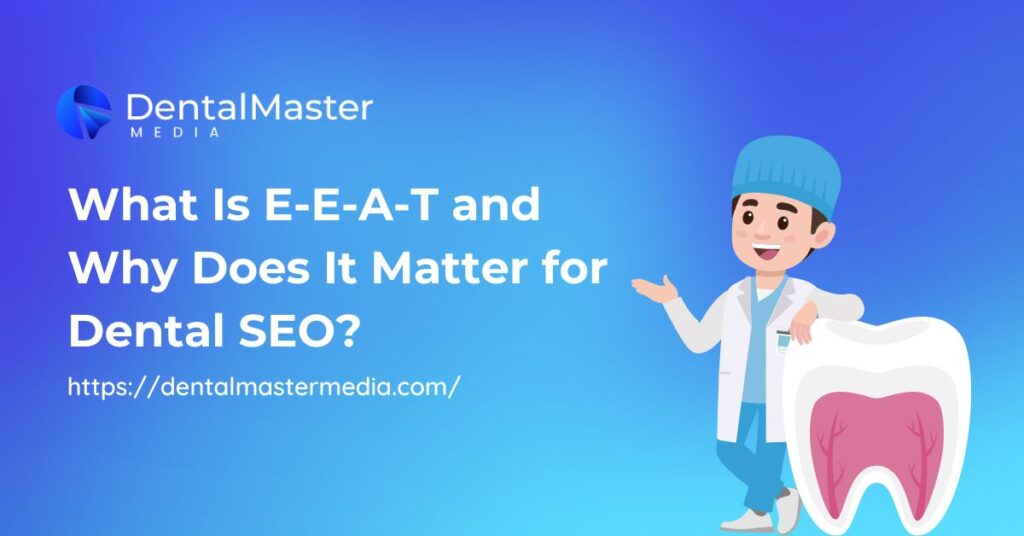When someone searches for a dentist online, they’re not just looking for any name—they’re looking for someone they can trust.
That trust often starts with a website. If a dental SEO clinic’s website looks professional, shares helpful advice, and includes real patient reviews, people feel more confident making an appointment.
Google works in a similar way. It wants to show people safe and reliable information, especially when it involves health.
That’s why Google pays close attention to something called E-E-A-T. It stands for Experience, Expertise, Authoritativeness, and Trust.
These four qualities help Google decide which dental websites are helpful and trustworthy enough to rank higher.
And if you want your dental clinic to show up on page one, understanding E-E-A-T is essential.
What Does E-E-A-T Stand For?
E-E-A-T might sound complicated at first, but each part becomes simple when you look at it through real dental examples.
Experience is about proving that you’ve worked with actual patients. You can show this through before-and-after photos of treatments or patient success stories shared on your site.
Expertise relates to your knowledge as a dental professional. Google wants to see that the person offering advice has the right training and background—like a licensed dentist or a qualified staff member.
Authoritativeness means others recognise your clinic as a trusted voice. This can come from being featured in local news, mentioned by dental associations, or having quality backlinks to your site.
Trust is the most important element. Google looks for signs that your website is safe and honest. Having visible contact details, clear policies, and authentic patient reviews all help build this trust.
These core areas are exactly what Dentist SEO Experts focus on when helping clinics improve their online presence.
How Google Uses E-E-A-T to Rank Dental Websites
Google’s main goal is to help users find the most accurate and helpful answers. That’s especially important for health topics.
When people ask questions like “How painful is a root canal?” or “What’s the best way to treat gum disease?”, Google needs to give them information that’s both correct and safe.
To help with that, Google trains human reviewers, known as Quality Raters. These people check websites and rate their quality based on things like E-E-A-T.
Their feedback helps Google fine-tune its algorithm so that websites with better content and trustworthiness rank higher.
If you’re a dental clinic, your website needs to reflect real dental knowledge and a trustworthy environment.
That’s where understanding and applying E-E-A-T can make a huge difference in search results.
Breaking Down Each Part of E-E-A-T
Experience: Real-World Dental Knowledge
Experience means having hands-on knowledge, and showing that clearly on your website.
You can talk about procedures you’ve done, share before-and-after images, or even post videos explaining treatments.
For example, if you regularly perform Invisalign treatments, you might show photos of how a patient’s teeth changed over six months.
You could also include a few words from the patient about how the process felt.
This type of real-world content gives your website credibility and helps people see you as experienced, not just knowledgeable.
Google values this kind of proof because it shows that you’re not just repeating facts—you’ve lived them. Your hands-on experience makes your advice more reliable.
Expertise: Showing Dental Skills
Expertise is about proving that you have the right education and background to talk about dentistry.
This can be shown through dentist bios on your website, which include details like dental degrees, years of experience, and areas of specialty.
If your blog or service pages are written or reviewed by your dental team, be sure to mention that.
Even a short note like “Reviewed by Dr. Patel, General Dentist” goes a long way. It helps Google and your readers know that your content is backed by someone who truly understands dental care.
Showing this level of expertise helps build patient confidence too. People want to know that the person behind the information is qualified and experienced.
Authoritativeness: Being a Recognised Source
Being authoritative means others trust and refer to you. It’s not just about what you say on your site—it’s also about what others say about you.
If your dental clinic has been featured in local health publications, community events, or dental directories, that adds to your authority. Getting backlinks from respected websites is another strong signal.
For instance, if a local news article links to your blog about cavity prevention, Google sees that as a vote of confidence.
Even social media shoutouts and mentions by other professionals can boost your authority. Over time, this builds a reputation that Google notices.
Trust: The Core of E-E-A-T
Trust is the foundation of everything. You can have experience and knowledge, but if your website doesn’t look safe or honest, people will leave—and so will Google.
Start with the basics: include your clinic’s phone number, email, and physical address clearly on the site.
Make sure your site uses HTTPS, which shows it’s secure. Add a privacy policy and terms of use page, especially if you collect any data through contact forms.
Patient reviews are another way to build trust. Add real testimonials (with permission) to show that others have had positive experiences with your clinic. Trust grows when your website is open, transparent, and easy to use.
Why E-E-A-T Matters Specifically for Dental SEO
Dental Topics Are Considered “YMYL” (Your Money or Your Life)
Google pays special attention to content that could impact someone’s health, safety, or financial situation.
These are known as “Your Money or Your Life” topics, and dental care clearly falls into that category.
That means dental websites are held to a higher standard than sites that just talk about hobbies or travel.
Google wants to see that the content on your dental site is written by experts, based on real experience, and built on trust.
For example, if you publish a blog post on how to deal with tooth sensitivity, it needs to be accurate and safe. If it gives bad advice, it could harm someone.
That’s why E-E-A-T is so important—it helps Google filter out unreliable content and boost trusted sources instead.
This is also why strong SEO Strategies for Dentists always include a focus on experience, expertise, and trustworthiness in every page and post.

Examples of Good E-E-A-T Practices for Dentists
One of the best ways to build E-E-A-T is by writing helpful content that answers real patient questions.
These could be blog posts like “What to Expect During Your First Dental Visit” or “How to Care for Braces at Home.”
Make sure these posts are either written by your team or reviewed by a licensed dentist. Use simple language so that patients can understand clearly.
Include real images from your clinic, especially in pages like “Our Services” or “Meet the Team.”
You might also show awards you’ve received or include success stories with your patients’ permission.
Each of these details strengthens your site’s credibility in Google’s eyes—and helps potential patients trust you too.
How E-E-A-T Impacts Rankings and Clicks
The more trustworthy and professional your dental website looks, the better chance it has of ranking high on Google.
When people search for dental services in their area, they usually click on websites that feel reliable and well-organised.
By improving E-E-A-T, your bounce rate can go down (because people stay longer on your site), and your click-through rate can go up (because your site looks helpful).
These are all good signals to Google that your site is worth promoting in search results.
If you’re focusing on Dental SEO, strong E-E-A-T supports your strategy. It not only helps improve your visibility, but also builds patient trust—making them more likely to book an appointment after visiting your site.
Tips to Improve E-E-A-T on Your Dental Website
To build stronger E-E-A-T, you don’t need fancy tools or tech skills. Start with simple, practical updates.
Add detailed team bios that include qualifications, experience, and photos. Include real patient reviews with names or initials.
Use real pictures from your clinic instead of stock photos. List any certifications, memberships, or awards your clinic has received.
Make sure your blog posts are accurate, and have someone from your team review them before publishing.
Lastly, answer common patient questions clearly and honestly. For example, a post like “Does teeth whitening hurt?” can help show both expertise and helpfulness.
By improving these areas bit by bit, your website will start to reflect real trust and quality—both for people and for search engines.
Conclusion
Trust and quality are key to any successful dental website. E-E-A-T—Experience, Expertise, Authoritativeness, and Trust—is how Google decides which sites are worth showing in search results, especially for health topics like dental care.
For dental clinics, applying E-E-A-T means sharing your knowledge, showing your experience, earning respect in the community, and building a website that feels honest and professional.
All of this not only helps your SEO—it helps people feel confident in choosing your clinic.
If you’re ready to take your dental website to the next level, Dental Master Media can help build a strong foundation of trust and authority that supports long-term growth.

Suraj Rana is the owner of Dental Master Media and a leading expert in SEO for dental practices. With a passion for dental marketing, he has successfully helped numerous dental clinics climb the search engine ranks. Suraj’s expertise makes him a go-to resource for effective, results-driven dental marketing.

